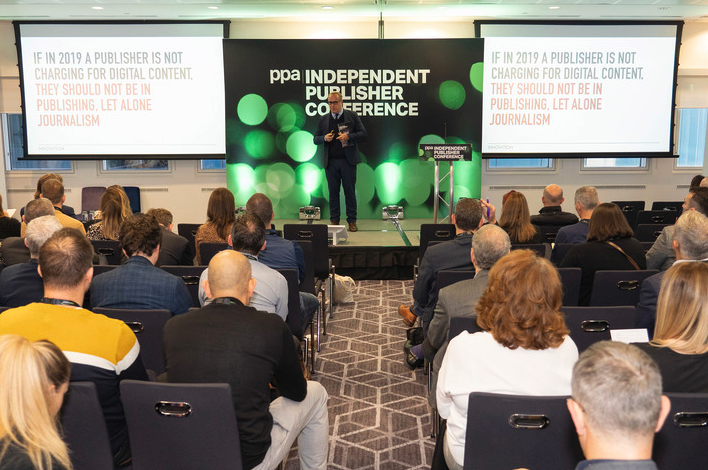Specialist media brands, by their very nature, have a tightly defined audience, whether individuals or companies. And with that close focus they are more likely to engage regularly with their customers than, say, news media. But the clear message I took away from the PPA IndPub event in November was that success in future will be driven by a determined obsession with understanding how your products (and services) solve problems for customers. Here’s my top takeaways:
The future is reader revenue
Advertising alone will not be sufficient for media brands, warned Juan Senor of Innovation Media Consulting. Reader revenue must become the core source of funding, at least 40% of total – The Economist and the New Yorker are now achieving 65% reader revenue. Content needs to be behind a data wall if not a paywall. Publishers are building more flexible, dynamic paywalls, proposing different offers to readers who behave in different ways. Smart media businesses can track what type of content triggers a subscription and produce more of it. Luckily consumers now have more of a subscription mindset, thanks to Netflix et al. and publishers need to experiment with pricing for monthly or even weekly packages. A strong subscription base can even enhance the advertising proposition by demonstrating a highly engaged and attentive audience.
The “reader revenue” message has clearly got through to niche publishers, judging by the thirty or so who attended my subscriptions round tables at the PPA IndPub event. They were most interested in discussing how to implement the steps to take their businesses from free to registered to paid content.
Convert to product thinking
A very similar message of customer focus was emphasised by Laura Jenner, Product Director at Immediate Media. Whether developing a new website feature or a completely new mobile digital product, the essence of “product thinking” is to put the customer at the heart of the business. Both hard data on actual behaviour and intuitive insight (based on talking to customers) are needed to decide what problem you need to solve. Because software development is expensive, the best approach is to test out ideas on paper and iterate before committing resource to build. And to be ruthless on working out the features that are valuable to the customer: it never pays to invest in building features that are simply nice to have. An important mindset for product development success is to focus not on the features you build, but the impact they have on the customer. Laura’s belief is that having a “product culture” throughout the whole company is more important than simply assembling the right technical skills.
Reward loyalty to boost retention
Acquiring subscribers is all well and good, but without a good retention strategy all your hard work could go to waste. Julian Thorne, a subscription marketing consultant, underlined the importance of making long term promises to subscribers that you can keep, and creating a good first impression by having a simple user experience and access to high quality content. From the beginning of the subscriber relationship, it’s essential to promote positive habits, as engaged subs are more likely to renew. And if you can treat customers as individuals and provide them with more personalised content and services, they will be more loyal. Julian shared the example of The Athletic which tailors its football coverage to favour your team, and also adjusts the timing of your daily briefing to suit when you prefer to open it. A final warning: take care to reward the loyalty of your current customers and avoid at all costs making more attractive offers to new customers.
Build value for customers
Chemical Watch is an established niche b2b publisher, providing a range of subscription news feeds and analysis to compliance professionals in the global chemical industry. Julian Rose, Founder, explained how they completely reinvented their business model based on an in-depth, eighteen-month customer research project led by a full-time former editor in the role of “Chief Customer Officer”. Based on these insights they repackaged their content into a single corporate membership package, which allowed multiple users within a customer organisation to customise their searches and share insights with colleagues. The membership package included e-learning and conferences as well as the main news and analysis content. Marketing is now focussed on the benefits that membership brings to customers (insight and networking) rather than the list of products available to purchase.
This radical change has meant a number of new roles and skills have been brought into the organisation. The sales pipeline is more complex and requires a more consultative approach, where a value plan is developed for each customer, and CW staff work with them to ensure that their use of the content and services helps deliver the value that was planned. Teams are organised around customers rather than individual products or publications. It’s still early days, but they are achieving renewal rates of 85% in volume terms and 147% in value terms as they gradually convert subscribers to the former set of publications onto the new corporate membership packages.
Overall, there was a simple strategic message across all these sessions, even if the practical implementation is complex. Invest time in listening to your customers and work out how you can solve their problems and deliver value. Then build a service that delivers those benefits and support them as they learn how to use it.
If you’d like to talk in more detail about how you can re-orientate your business towards reader revenue and customer focus, get in touch for an open-minded conversation over the phone or over a coffee.
About the author
Carolyn Morgan has bought, sold, launched and grown specialist media businesses across print, digital and live events. A founder of the Specialist Media Show (sold in 2014) she now advises media businesses large and small on their digital strategy through her consultancy Speciall Media.

